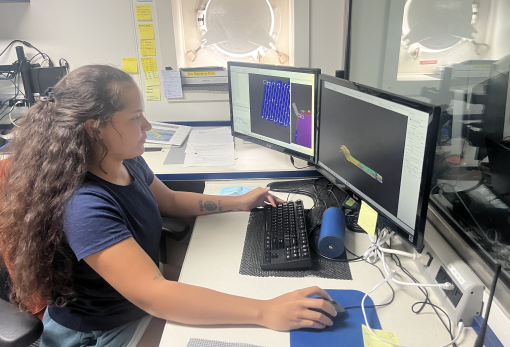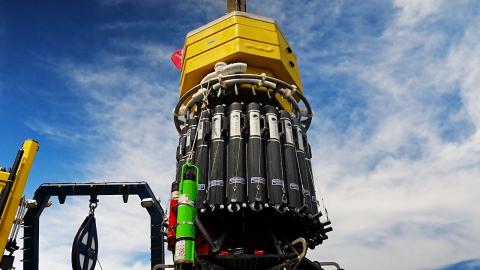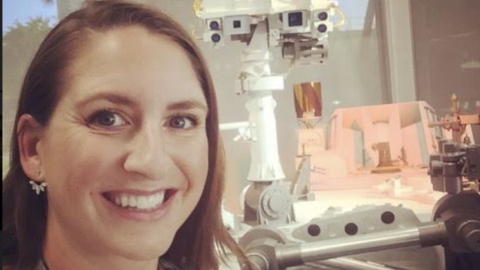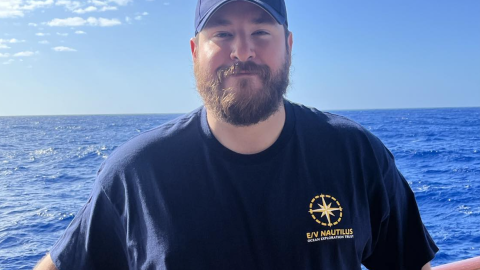Meet Ocean Explorer Casidhe Mahuka

OET proudly welcomes Casidhe Mahuka to the Corps of Exploration as part of the Science & Engineering Internship Program. This internship program supports community college, undergraduate, and graduate students in building professional workforce experience and exploring STEM-related careers that connect to research themes like robotics, ocean science, education, and exploration. Casidhe is joining E/V Nautilus for our NA157 expedition as a seafloor mapping intern.
We sat with Casidhe to learn more about her experience at sea and the path that led her to Nautilus.
Can you tell us a little about your background? What influenced you as a child?
I was born and raised in American Samoa, a U.S. territory and the eastern portion of the Samoan archipelago approximately 2,200 miles southwest of Hawaii. Growing up, my parents put me in many extra-curricular activities such as The Boys and Girls Club, The Junior State of America, baseball, softball, wrestling, art club, swimming lessons, and more. The activities that I enjoyed most growing up involved anything that got me outside of the house or outside of the classroom. My favorite activity was family beach days. As soon as we would get to the beach, I'd slap on a pair of goggles and be stuck staring at starfish, petting sea cucumbers, and chasing turtles for hours. When I got into high school, I was able to dive deeper into marine studies, and the rest is history.
When you were a kid, what did you want to be when you grew up?
I was nine during my first career festival, and I thought the coolest people who showed up were the firefighters, so of course, that's what I wanted to be. I always loved being in the ocean as a fun activity with my family. What first sparked my interest in marine science as a career was a field trip I had in the 9th grade at the National Marine Sanctuary of American Samoa (NMSAS). Jean-Michel Cousteau, the son of the infamous Jacques Cousteau. Jean-Michel gave an amazing presentation on the work he and his father accomplished. That was also the first time I found out that you could not only breathe underwater, but you could also breathe underwater for a living. I was sold.
What would you consider to be your greatest challenge entering this field?
As a Pacific Islander, I have been extremely fortunate in receiving funding and support from local and international programs encouraging Pacific Islanders to pursue higher degrees. I have not only been supported by my peers and professors, but I have also been fortunate to have a lot of support within my household. The greatest challenge I have faced entering this field was mostly self-doubt on whether I have what it takes to pursue a career in marine science. I wanted to bail on my degree a handful of times to join the US Coast Guard, but my mom did not let that happen. I pushed through and am actually considering getting my Master's Degree. When there's a will, there's a way.
Do you have any advice for someone looking to follow a similar path?
Keep going, it's totally worth it. A career in marine science allows you to travel around the world, where you get to meet and learn from amazing and intellectual people who have the exact same passion as you and I do! Hang out with people that push you to pursue your dreams. Prioritize your work; play hard and work harder.
What's next for your ocean studies and career?
I am currently working as an Invasive Species Coordinator at the Coral Reef Advisory Group (CRAG). I intend to do this for another year or two and then pursue a Master's degree in marine science.

Hawaiʻi Mapping
This ten-day expedition will start and end in Honolulu and utilize the deep-water mapping capabilities of E/V Nautilus to survey previously unmapped seafloor in the U.S. EEZ south of the Main Hawaiian Islands.



